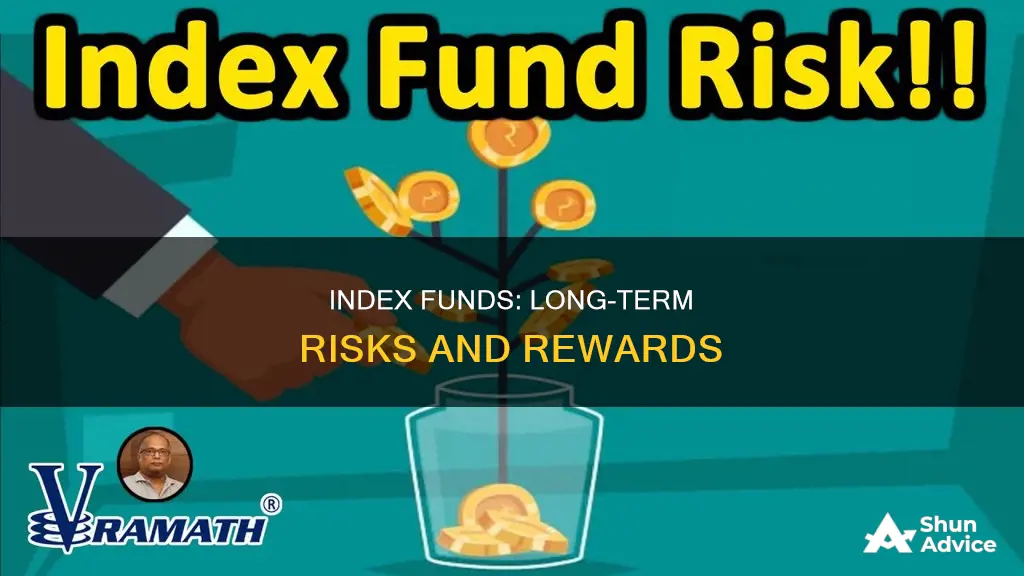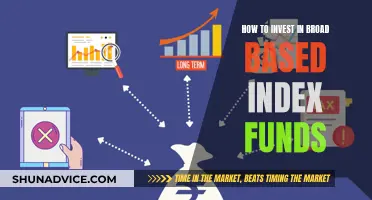
Index funds are a popular investment choice due to their diversification, low costs, and passive investment strategy. They are considered relatively safe compared to individual stocks as they are highly diversified, investing in a wide range of equities. However, some investors choose to avoid index funds due to a lack of downside protection, inability to react to overvalued stocks, and limited exposure to different strategies. So, is it risky to invest 100% in an index fund for the long term? While index funds are generally considered a low-risk investment, putting all your eggs in one basket may not be the best strategy. Diversification is often touted as a risk mitigator, and by investing in a variety of funds or individual stocks, you can further reduce the risk of significant fluctuations in your portfolio's value.
| Characteristics | Values |
|---|---|
| Risk | Considered low-risk due to diversification. |
| Returns | Historically, indexes tend to rise over time. |
| Cost | Low-cost investment option. |
| Control | No control over the individual holdings in the portfolio. |
| Strategy | Single strategy only. |
| Emotional impact | Emotional, bad decisions are less likely. |
What You'll Learn

Index funds are safer than individual stocks
Index funds are generally considered safer than individual stocks due to their inherent diversification. They are a type of investment fund, either a mutual fund or an exchange-traded fund (ETF), that tracks the performance of a market index, such as the S&P 500. This means that an index fund contains a broad range of stocks across various sectors, reducing the risk associated with individual stocks.
Diversification
Index funds provide diversification by investing in a wide variety of stocks across different sectors and industries. This lowers the risk of losing money, as the performance of the fund is not dependent on a single stock or industry. If one stock performs poorly, it will have a minimal impact on the overall fund.
Lower Risk
Investing in an index fund is generally considered lower risk than investing in individual stocks. While there is still a possibility of losing money, the diversified nature of index funds means that the risk is spread across a larger number of stocks. This makes it less likely for an investor to lose a significant portion of their investment.
Low Cost
Index funds typically have lower expense ratios compared to actively managed funds. This means that investors pay less in fees, which can result in higher returns over time. The low costs of index funds make them attractive for long-term investing.
Broad Market Exposure
Index funds provide broad market exposure, allowing investors to invest in a wide range of stocks or bonds. This diversification across various sectors and asset classes helps to reduce risk and provides a more stable investment option.
Historical Performance
Over the long term, index funds have often outperformed actively managed funds, especially after accounting for fees and expenses. This is because index funds have lower expenses and fees, and their passive investing strategy allows them to avoid the higher costs associated with active fund management.
Tax Efficiency
Index funds have lower turnover rates, resulting in fewer capital gains distributions, which makes them more tax-efficient than actively managed funds. This can be beneficial for investors, especially in taxable accounts.
While index funds offer several advantages over individual stocks, it is important to remember that they are not completely risk-free. They are subject to market swings and can underperform in certain situations. Additionally, they may not provide the same level of flexibility and control as investing in individual stocks. However, for long-term investors, index funds can be a safer and more cost-effective option.
College Fund: When to Shift to Safer Investments?
You may want to see also

Index funds are ideal for investors with IRAs and 401(k) accounts
Index funds are ideal holdings for investors with IRAs and 401(k) accounts. Here are some reasons why:
Low Fees and Costs
Index funds are often associated with low fees and costs. They tend to have lower expense ratios compared to other types of investments, making them inexpensive to own. Index funds are passively managed, aiming to replicate the performance of a particular market index. This passive investment strategy means they require little to no hands-on management by professionals, resulting in lower management fees for investors.
Diversification
Index funds provide broad market exposure and diversification. They are typically highly diversified, investing in a wide range of securities or stocks across different industries and sectors. This diversification reduces risk and makes it almost impossible for the fund to reach a value of zero. Even if one company or sector experiences difficulties, the impact on the overall fund is minimised due to the variety of underlying investments.
Long-Term Performance
Index funds have demonstrated solid long-term performance. For example, the S&P 500's long-term record of about 10% annual returns showcases the potential for strong gains over time. While there may be fluctuations and downturns, the overall market and major indexes tend to rise over the long term, making index funds a good choice for investors seeking consistent returns.
Suitability for Different Investor Profiles
Index funds are suitable for a range of investor profiles, especially those who don't want to actively manage their investments or worry about day-to-day fluctuations. They are ideal for novice investors, long-term investors, and those who prefer a passive investment approach. Additionally, the diversification offered by index funds helps investors capture returns from a mix of investments while reducing risk.
Tax Benefits
Index funds can also provide tax benefits, particularly within 401(k) plans. Contributions to traditional 401(k) plans are often made with pre-tax money, allowing investors to reduce their federal taxable income. Additionally, any gains made over time are not taxed as long as the money remains in the 401(k) plan. This makes index funds a tax-efficient way to invest for retirement within these plans.
In summary, index funds offer a range of benefits that make them ideal for investors with IRAs and 401(k) accounts. Their low fees, diversification, long-term performance potential, suitability for various investor profiles, and tax advantages make them a compelling choice for those seeking a relatively safe and passive investment strategy.
Transferring Funds: Chase Investment Accounts Simplified
You may want to see also

Index funds are passively managed
Passive management is the opposite of active management, where a fund manager selects stocks and other securities to include in a portfolio, attempting to beat the market with various investment strategies. In contrast, index funds have a buy-and-hold investment strategy, with the goal of matching the performance of the index they track. This means there is no need for human oversight on buying and selling within the fund, as its holdings automatically track the index. For example, if a stock is in the S&P 500, it will also be in an S&P 500 index fund.
Passively managed funds tend to charge lower fees to investors than actively managed funds. This is because actively managed funds have higher management fees, higher trading costs, and higher turnover. The higher fees of active funds can cut into investor returns, leading many of them to underperform compared to passive funds. According to the Efficient Market Hypothesis (EMH), active managers cannot beat the market for long, as their success is only a matter of chance. Over the long term, passive management tends to deliver better returns.
Index funds are ideal for investors who don't want to actively manage their investments or worry about the day-to-day fluctuations in the value of individual stocks. They are also a good choice for those who want a more passive approach to investing and for tax-sensitive investors. Additionally, the passive management style of index funds allows managers to charge lower investment advisory fees.
Strategic Development: Unlocking Investment Opportunities
You may want to see also

Index funds are less liquid than ETFs
Index funds are a type of mutual fund that tracks an index, such as the S&P 500. They are considered ideal holdings for certain investors with individual retirement accounts (IRAs) and 401(k) accounts. Index funds are known for their passive investing strategy, where they employ a buy-and-hold investment strategy. This is in contrast to actively managed funds, which attempt to outperform a benchmark index.
Index funds are traded with the fund manager, so there is always a buyer for your shares, although the exact price may not be known. ETFs, on the other hand, require a buyer, so if there is little interest in a particular ETF, the seller may be stuck with their shares until a buyer is found.
ETFs are also more liquid because they can be traded throughout the day, whereas index funds do not have a new value set until the end of the trading day. This makes ETFs a more flexible option for investors who want to take advantage of micro-swings in the market.
Additionally, ETFs have a lower entry price than index funds, making them more accessible to investors with limited funds.
However, it is important to note that a low-volume ETF can actually be less liquid than an index fund. This is because the primary factors influencing an ETF's liquidity are its composition and the trading volume of the securities that comprise it. If an ETF has low-volume securities, it may be difficult to find a buyer when the seller wants to sell.
In summary, while index funds are considered relatively safe and stable investments, they are less liquid than ETFs due to differences in trading frequency, buyer availability, and entry price.
Maximizing Your HSA Funds: Smart Investment Strategies
You may want to see also

Index funds are inexpensive to own
Additionally, index funds have low turnover costs since securities are bought and held rather than frequently traded. This buy-and-hold strategy further reduces costs for investors. The broad diversification of index funds also contributes to their cost-effectiveness. By investing in a wide range of securities within an index, investors can achieve greater diversification at a lower cost compared to investing in individual stocks.
Index funds are also easily accessible to investors, as they can be purchased directly from mutual fund companies or brokerages, and some funds have low minimum investment requirements. For instance, Charles Schwab Corporation offers index funds with a minimum investment of $100. Overall, index funds provide a cost-effective way for investors to gain diversified exposure to the stock market.
Mutual Funds: Bulk Investment Strategies for Maximum Returns
You may want to see also
Frequently asked questions
Investing 100% of your portfolio in an index fund can be risky due to a lack of downside protection and diversification. Index funds are designed to mirror the performance of a specific market index, which means they are vulnerable to market corrections and crashes. To reduce risk, it is generally recommended to diversify your portfolio across different investments.
It is highly unlikely that you will lose all your money investing in an index fund due to the diversification and broad market exposure they provide. Index funds invest in a broad range of securities, and it is extremely improbable that every stock in the index will go to zero at the same time.
Index funds offer broad market exposure, low operating expenses, and low portfolio turnover. They are a passive investment strategy, which means they have a buy-and-hold approach rather than actively trying to beat the market. Index funds are ideal for investors who want a more hands-off approach and don't want to actively manage their investments.
While index funds are considered relatively safe investments compared to individual stocks, they do carry some risks. One risk is the lack of reactive ability, as index funds are set portfolios and do not allow investors to act on overvalued or undervalued stocks. Another risk is the lack of control over holdings, as investors cannot choose the specific companies they want to invest in.
You can invest in index funds by purchasing them directly from the fund company or through a broker. Index funds can be bought and sold at the end of each trading day, and many investors choose to buy and hold for the long term. When investing in index funds, it is important to consider the fund's diversification, expenses, and long-run performance.







